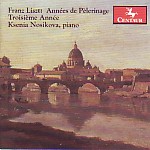In the third and least-performed book of Liszt’s Années de Pèlerinage, pianist Ksenia Nosikova upholds the excellent standards she brought to the cycle’s first two volumes (also on Centaur). Although Nosikova’s exceptional pianism doesn’t tap into the tonal refinement and personalized touches that ensure Zoltan Kocsis’ number-one reference position, she nevertheless keeps sparse, austere selections like the two Thrénodies and the Marche funèbre aloft and fluid. She also is attuned to Liszt’s harmonic inventiveness: notice how tellingly she shades the odd major-to-minor shifts in Angelus! Prière aux anges gardiens. Perhaps her basic tempo for Les jeux d’eau à la Villa d’Este (the cycle’s most popular piece) is too fast, yet no arpeggio or tremolo is simply rattled off; every note is carefully voiced and well considered. I admire the energy and sweep Nosikova brings to the E major Polonaise, but she impatiently pushes and pulls at the basic pulse as if she felt it necessary to do more, rather than accept the polonaise rhythm for its swaggering self. But my tiny bones to pick mean little in light of the total sum of Nosikova’s outstanding achievements.
































